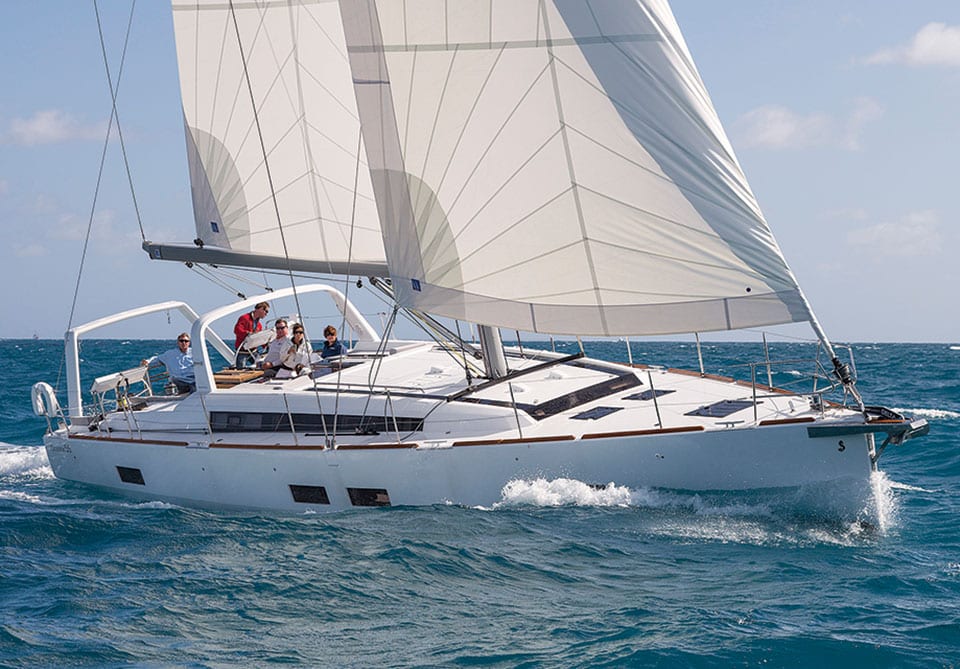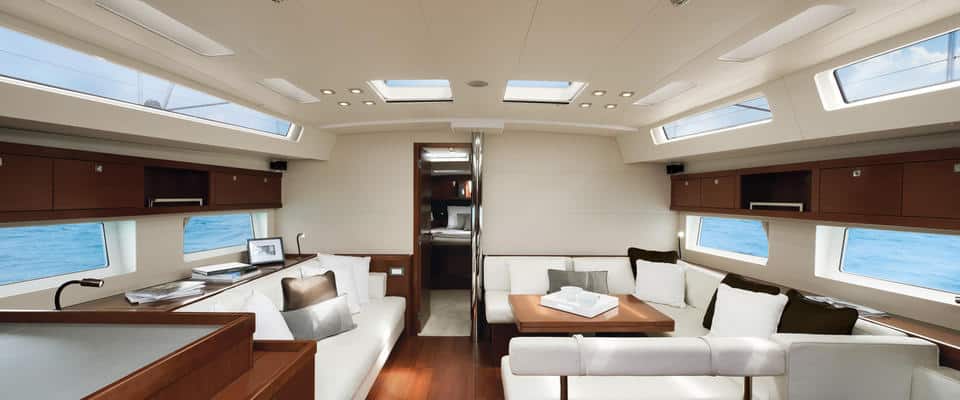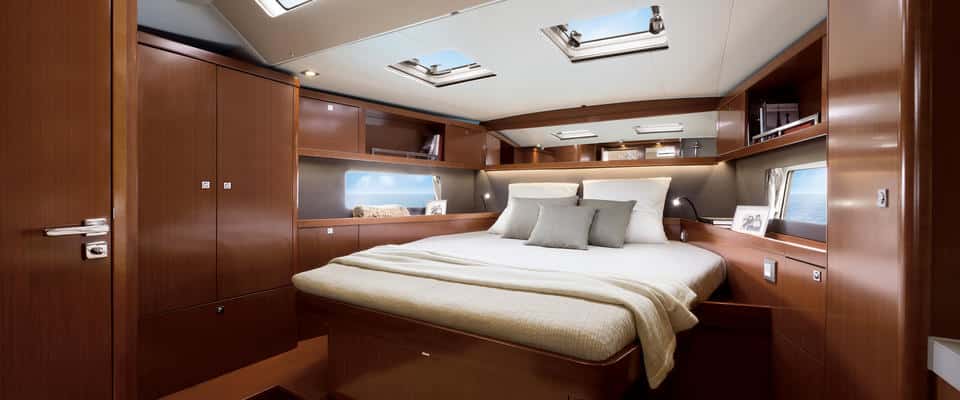
Beneteau Oceanis 55
“Cat killer” I wrote and underlined in my notebook as we turned the bow of the new Beneteau Oceanis 55 toward Florida’s Government Cut and the Port of Miami. It was a gorgeous February day for sailing. The wind hovered in the 10- to 12-knot range, and to be honest, we’d just had a ball letting the big, powerful monohull strut its stuff while close-reaching at 7 and 8 knots alongside three Bahamas-bound Lagoon catamarans, cousins, if you will, in the Groupe Beneteau family.
Besides being big and comfortable and good looking, this latest Oceanis from designer Berret Racoupeau is a hoot to sail. When the puffs come on, hard chines that carry aft from well forward of the mast dig in to keep the boat upright and tracking straight, even with the 4-foot-9-inch Bahamas-friendly keel that had been ordered on this model. (The standard keel measures 5 feet 11 inches; the deep option is a 7-foot-3-inch foil.) Twin rudders give you lots of feedback at either of the two helms—and they, in turn, provide a variety of seating options, letting you choose the best sightline forward. I preferred the lee rail, where I could watch the telltales on the 105-percent genoa.

On recent Oceanis models, the 55 included, the masts have been moved aft, allowing for a larger headsail and a slightly smaller main. The result is two sails of nearly equal size and a balanced, easy-to-handle sail plan. The boat can be ordered with an optional inner forestay and self-tending staysail, greatly expanding your choices for adjusting to conditions, and there’s a bail on the anchor roller for tacking down a code zero or cruising chute.
Bowing to the notion that a lot of time is spent topside, the cockpit on the 55 occupies roughly a third of the length of the boat. From the dock, you step aboard across an electric-powered swim platform and then pass between the helms to reach the lounging area: two full-length cushioned benches to either side of a four-leaf teak cockpit table. Forward of the main cockpit arch, which anchors the mainsheet, there are two more cushioned sunbeds to either side of the companionway that could double as protected off-watch sleeping areas if the optional dodger is in place. Raised, the swim platform folds in on itself to make a cockpit-wide helm seat. The seat also covers a slight step down at the far aft end of the cockpit that tripped me up just about every time I crossed it.
The cockpit feature I found most intriguing was the electric primary winches, located just inboard of each helm. Mere steps apart, they made shorthanded tacking simple.
The companionway is an area that Beneteau has really thought through. The steps flow into the cabin so that you feel as though you’re gliding downstairs rather than clamoring down a ladder. Once in the saloon, you do search briefly for handholds before taking a couple of steps forward or to either side, where furniture or overhead rails are within your grasp. Down below, I was struck by the amount of volume that the 16-plus feet of beam, carried aft from the main bulkhead, creates. The model we sailed had three cabins and two heads (up to five cabins and four heads are possible), and there’s even a double-bunk crew quarters just aft of the anchor locker, complete with head and vanity, should a captain and mate be in your cruising budget.

Under power, noise levels below were quite tolerable. The 75-horsepower Yanmar pushed us along in the high 8-knot range at cruising rpm; get-home-fast speed was a little better than 9. The boat we sailed had the optional Dock & Go joystick control and pod-drive system; however, with the twin rudders, the boat backed well on its own both to port and starboard. From cruising speed we stopped nearly on a dime.
Lavishly fit out with amenities that included a dishwasher, a top- and front-loading refrigerator, a pop-up flat-screen television in the saloon, and four, count ’em, four large Simrad MFDs at the helm stations, the boat’s sailaway price was $740,000.
Given the many options for keels, sail plans, accommodations, and amenities, the Oceanis 55 is a very versatile sailing platform to get you quickly and comfortably to a faraway secluded anchorage or a nearby bustling marina. And better yet, chances are that you may arrive ahead of the cat crowd.
Beneteau Oceanis 55
| LOA | 55’ 1” (16.79 m.) |
| LWL | 49’ 9” (15.16 m.) |
| Beam | 16’ 3” (4.95 m.) |
| Draft (shoal/std./deep) | 4’ 9”/ 5’ 11”/ 7’ 3” (1.45/1.80/2.21 m.) |
| Sail area | 1,496 sq. ft. (139 sq. m.) |
| Ballast (shoal/std./deep) | 11,677/10,932/9,676 lb. (5,297/4,959/4,389 kg.) |
| Displacement | 36,807 lb. (16,696 kg.) |
| Ballast/D (shoal/std./Deep) | .32/.30/.26 |
| D/L | 133 |
| SA/D | 21.6 |
| Water | 269 gal. (1,018 l.) |
| Fuel | 189 gal. (600 l.) |
| Holding (3 heads) | 63 gal. (238 l.) |
| Mast Height | 78’ 5” (23.90 m.) |
| Engine | 75-hp. Yanmar with Dock & Go pod |
| Designer | Berret Racoupeau |
| Price | $740,000 |
Beneteau
(843) 629-5300
www.beneteauamerica.com
Mark Pillsbury is CW’s editor.
To read more Cruising World reviews of Beneteau sailboats, click here. To visit Beneteau America’s website, click here.








